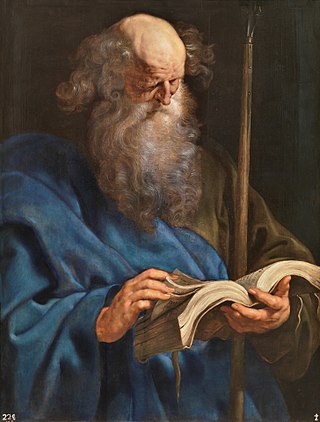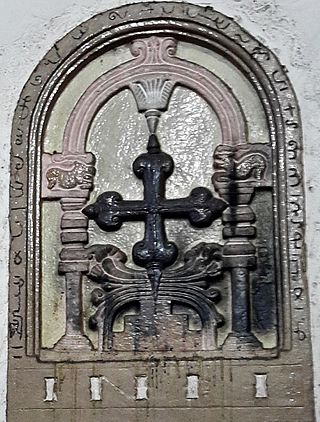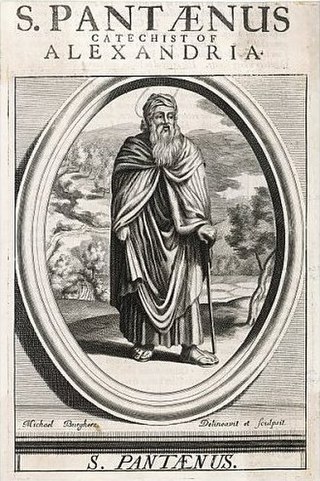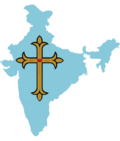
Pope Agatho served as the bishop of Rome from 27 June 678 until his death. He heard the appeal of Wilfrid of York, who had been displaced from his see by the division of the archdiocese ordered by Theodore of Canterbury. During Agatho's tenure, the Sixth Ecumenical Council was convened to deal with monothelitism. He is venerated as a saint by both the Catholic and Eastern Orthodox churches. He is said to have been the longest lived Pope ever.

Pope Sylvester I was the bishop of Rome from 31 January 314 until his death on 31 December 335. He filled the See of Rome at an important era in the history of the Western Church, though very little is known of his life.

Thomas the Apostle, also known as Didymus, was one of the Twelve Apostles of Jesus according to the New Testament. Thomas is commonly known as "Doubting Thomas" because he initially doubted the resurrection of Jesus Christ when he was told of it ; he later confessed his faith on seeing the places where the wounds appeared still fresh on the holy body of Jesus after the Crucifixion of Jesus. While it is often assumed he touched the wounds in art and poetry, the scriptures do not say that he touched the wounds, merely that Jesus invited him to do so, with it being unclear if he actually felt them.

The Malankara Orthodox Syrian Church (MOSC) also known as the Indian Orthodox Church (IOC) or simply as the Malankara Church, is an autocephalous Oriental Orthodox church headquartered in Devalokam, near Kottayam, India. It serves India's Saint Thomas Christian population. According to tradition, these communities originated in the missions of Thomas the Apostle in the 1st century. It employs the Malankara Rite, an Indian form of the West Syriac liturgical rite.

The Saint Thomas Christians, also called Syrian Christians of India, Marthoma Suriyani Nasrani, Malankara Nasrani, or Nasrani Mappila, are an ethno-religious community of Indian Christians in the state of Kerala, who, for the most part, employ the Eastern and Western liturgical rites of Syriac Christianity. They trace their origins to the evangelistic activity of Thomas the Apostle in the 1st century. The Saint Thomas Christians had been historically a part of the hierarchy of the Church of the East but are now divided into several different Eastern Catholic, Oriental Orthodox, Protestant, and independent bodies, each with their own liturgies and traditions. They are Malayalis and their mother tongue is Malayalam. Nasrani or Nazarene is a Syriac term for Christians, who were among the first converts to Christianity in the Near East.

Simon the Zealot, also the Canaanite or the Canaanean was one of the apostles of Jesus. A few pseudepigraphical writings were connected to him, but Jerome does not include him in De viris illustribus written between 392 and 393 AD.
An apostolic see is an episcopal see whose foundation is attributed to one or more of the apostles of Jesus or to one of their close associates. In Catholicism, the phrase "The Apostolic See" when capitalized refers specifically to the See of Rome.

TheCatholic Encyclopedia: An International Work of Reference on the Constitution, Doctrine, Discipline, and History of the Catholic Church, also referred to as the Old Catholic Encyclopedia and the Original Catholic Encyclopedia, is an English-language encyclopedia published in the United States. The first volume appeared in March 1907 and the last three volumes appeared in 1912, followed by a master index volume in 1914 and later supplementary volumes. It was designed "to give its readers full and authoritative information on the entire cycle of Catholic interests, action and doctrine".

The Syro-Malabar Church, also known as the Syro-Malabar Catholic Church, is an Eastern Catholic church based in Kerala, India. It is a sui iuris (autonomous) particular church in full communion with the Holy See and the worldwide Catholic Church, with self-governance under the Code of Canons of the Eastern Churches (CCEO). The major archbishop presides over the entire church. The incumbent Major Archbishop is Raphael Thattil, serving since January 2024. It is the largest Syriac Christian church and the largest Eastern Catholic church. Syro-Malabar is a prefix reflecting the church's use of the East Syriac liturgy and origins in Malabar. The name has been in usage in official Vatican documents since the nineteenth century.
Vicar of Christ is a term used in different ways and with different theological connotations throughout history. The original notion of a vicar is as an "earthly representative of Christ", but it is also used in the sense of "person acting as parish priest in place of a real person." The title is now used in Catholicism to refer to the bishops, and more specifically, was historically used to refer to the Bishop of Rome.

According to Eastern Christian tradition, Addai of Edessa or Thaddeus of Edessa was one of the seventy disciples of Jesus.

The Apostolic Canons, also called Apostolic canons, Ecclesiastical Canons of the Same Holy Apostles, or Canons of the Holy Apostles, is a 4th-century Syrian Christian text. It is an Ancient Church Order, a collection of ancient ecclesiastical canons concerning the government and discipline of the Early Christian Church, allegedly written by the Apostles. This text is an appendix to the eighth book of the Apostolic Constitutions. Like the other Ancient Church Orders, the Apostolic Canons uses a pseudepigraphic form.

Saint Pantaenus the Philosopher was a Greek theologian and a significant figure in the Catechetical School of Alexandria from around AD 180. This school was the earliest catechetical school, and became influential in the development of Christian theology.

St. Thomas College (Autonomous), Thrissur, is a government aided catholic college located in Thrissur, Kerala, India. Established as a college in 1918, the college is considered to be one of the oldest and premier instituitions of higher education in Princely State of Cochin. It is the first Catholic college in Kerala and is conducted by the Syro-Malabar Catholic Archdiocese of Thrissur. The college is affiliated with the University of Calicut.

The Archeparchy of Trichur, in Thrissur District of Central Kerala, India, with nearly half a million Syro-Malabar Catholics now, used to be the largest Catholic diocese in India when it included the Syro-Malabar Catholic Diocese of Irinjalakuda until 1978 and Syro-Malabar Catholic Eparchy of Palghat until 1973. Syro-Malabar Catholic Diocese of Irinjalakuda, also located in Thrissur District, has over a quarter million Syro-Malabar Catholics now. Syro-Malabar Catholic Diocese of Palghat in Central Kerala extends to some regions in the neighbouring state of Tamil Nadu. In 2010, the parts of Tamil Nadu under the Syro-Malabar Catholic Diocese of Palghat were separated to form another Syro-Malabar Catholic Diocese of Ramanathapuram.

Christianity is the third-largest practiced religion in Kerala, accounting for 18% of the population according to the 2001 Indian census. According to traditional accounts, Thomas the Apostle sailed to the Malabar region in 52 AD and introduced Christianity to the area. Although a minority, the Christian population of Kerala is proportionally much larger than that of India as a whole. A significant portion of the Indian Christian population resides in the state.
The historical roots of Papal primacy can be traced back to the early centuries of Christianity, wherein the bishop of Rome, commonly referred to as the Pope, gradually accrued increasing authority and recognition. A confluence of historical, theological, and political factors contributed to this development.

India-Holy See relations are the bilateral relations between the India and Holy See, which is sovereign over the Vatican City. Formal bilateral relations between the two exist since 12 June 1948. An Apostolic Delegation existed from 1881. The Holy See has a nunciature in New Delhi while India has accredited its embassy in Vienna, Austria to the Holy See as well. India's Ambassador in Bern has traditionally been accredited to the Holy See. Since 2020, Jaideep Mazumdar, India's ambassador to Austria has been the ambassador to the Holy See. Archbishop Leopoldo Girelli was appointed as the Apostolic Nuncio to India in March 2021.

The Saint Thomas Christian denominations are Christian denominations from Kerala, India, which traditionally trace their ultimate origins to the evangelistic activity of Thomas the Apostle in the 1st century. They are also known as "Nasranis" as well. The Syriac term "Nasrani" is still used by St. Thomas Christians in Kerala. It is part of the Eastern Christianity institution.














